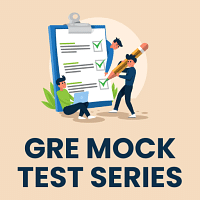GRE Exam > GRE Questions > Can I find marks weightage data for the diffe...
Start Learning for Free
Can I find marks weightage data for the different essays in the GRE Analytical Writing section (Issue and Argument tasks)?
Most Upvoted Answer
Can I find marks weightage data for the different essays in the GRE An...
Weightage of Essays in the GRE Analytical Writing section
Introduction:
The GRE (Graduate Record Examination) Analytical Writing section consists of two tasks - the Issue task and the Argument task. Each task requires test-takers to write an essay within a given time limit. While the GRE scoring process is not disclosed to the public, it is possible to understand the weightage of these essays based on the official scoring guide provided by ETS (Educational Testing Service), the organization that administers the GRE.
Weightage of the Issue Task:
The Issue task requires test-takers to present their perspective on a given topic. The essay should effectively analyze the issue, provide relevant examples, and support the arguments with well-structured reasoning. Although the exact weightage of the Issue task is not explicitly stated, it is generally considered to contribute 30% of the overall Analytical Writing score.
Weightage of the Argument Task:
The Argument task requires test-takers to critically analyze a given argument. The essay should identify and evaluate the logical flaws, assumptions, and evidence presented in the argument. Similar to the Issue task, the weightage of the Argument task is not explicitly mentioned. However, it is generally believed to contribute 30% of the overall Analytical Writing score.
Combined Weightage:
While the exact weightage of the Issue and Argument tasks is not disclosed, it is widely accepted that they collectively contribute 60% of the overall Analytical Writing score.
Other Factors:
Apart from the individual task weightage, it is important to note that other factors also influence the final score. The clarity of ideas, coherence, organization, use of appropriate vocabulary, and grammar also play a significant role in the scoring process.
Conclusion:
Although the exact weightage of the Issue and Argument tasks in the GRE Analytical Writing section is not explicitly specified, it is generally accepted that these two tasks collectively contribute 60% of the overall score. It is crucial for test-takers to focus on developing strong analytical and writing skills to perform well in these tasks. Practice, preparation, and understanding the scoring criteria provided by ETS will greatly enhance the chances of achieving a high score.
Introduction:
The GRE (Graduate Record Examination) Analytical Writing section consists of two tasks - the Issue task and the Argument task. Each task requires test-takers to write an essay within a given time limit. While the GRE scoring process is not disclosed to the public, it is possible to understand the weightage of these essays based on the official scoring guide provided by ETS (Educational Testing Service), the organization that administers the GRE.
Weightage of the Issue Task:
The Issue task requires test-takers to present their perspective on a given topic. The essay should effectively analyze the issue, provide relevant examples, and support the arguments with well-structured reasoning. Although the exact weightage of the Issue task is not explicitly stated, it is generally considered to contribute 30% of the overall Analytical Writing score.
Weightage of the Argument Task:
The Argument task requires test-takers to critically analyze a given argument. The essay should identify and evaluate the logical flaws, assumptions, and evidence presented in the argument. Similar to the Issue task, the weightage of the Argument task is not explicitly mentioned. However, it is generally believed to contribute 30% of the overall Analytical Writing score.
Combined Weightage:
While the exact weightage of the Issue and Argument tasks is not disclosed, it is widely accepted that they collectively contribute 60% of the overall Analytical Writing score.
Other Factors:
Apart from the individual task weightage, it is important to note that other factors also influence the final score. The clarity of ideas, coherence, organization, use of appropriate vocabulary, and grammar also play a significant role in the scoring process.
Conclusion:
Although the exact weightage of the Issue and Argument tasks in the GRE Analytical Writing section is not explicitly specified, it is generally accepted that these two tasks collectively contribute 60% of the overall score. It is crucial for test-takers to focus on developing strong analytical and writing skills to perform well in these tasks. Practice, preparation, and understanding the scoring criteria provided by ETS will greatly enhance the chances of achieving a high score.
Attention GRE Students!
To make sure you are not studying endlessly, EduRev has designed GRE study material, with Structured Courses, Videos, & Test Series. Plus get personalized analysis, doubt solving and improvement plans to achieve a great score in GRE.

|
Explore Courses for GRE exam
|

|
Can I find marks weightage data for the different essays in the GRE Analytical Writing section (Issue and Argument tasks)?
Question Description
Can I find marks weightage data for the different essays in the GRE Analytical Writing section (Issue and Argument tasks)? for GRE 2024 is part of GRE preparation. The Question and answers have been prepared according to the GRE exam syllabus. Information about Can I find marks weightage data for the different essays in the GRE Analytical Writing section (Issue and Argument tasks)? covers all topics & solutions for GRE 2024 Exam. Find important definitions, questions, meanings, examples, exercises and tests below for Can I find marks weightage data for the different essays in the GRE Analytical Writing section (Issue and Argument tasks)?.
Can I find marks weightage data for the different essays in the GRE Analytical Writing section (Issue and Argument tasks)? for GRE 2024 is part of GRE preparation. The Question and answers have been prepared according to the GRE exam syllabus. Information about Can I find marks weightage data for the different essays in the GRE Analytical Writing section (Issue and Argument tasks)? covers all topics & solutions for GRE 2024 Exam. Find important definitions, questions, meanings, examples, exercises and tests below for Can I find marks weightage data for the different essays in the GRE Analytical Writing section (Issue and Argument tasks)?.
Solutions for Can I find marks weightage data for the different essays in the GRE Analytical Writing section (Issue and Argument tasks)? in English & in Hindi are available as part of our courses for GRE.
Download more important topics, notes, lectures and mock test series for GRE Exam by signing up for free.
Here you can find the meaning of Can I find marks weightage data for the different essays in the GRE Analytical Writing section (Issue and Argument tasks)? defined & explained in the simplest way possible. Besides giving the explanation of
Can I find marks weightage data for the different essays in the GRE Analytical Writing section (Issue and Argument tasks)?, a detailed solution for Can I find marks weightage data for the different essays in the GRE Analytical Writing section (Issue and Argument tasks)? has been provided alongside types of Can I find marks weightage data for the different essays in the GRE Analytical Writing section (Issue and Argument tasks)? theory, EduRev gives you an
ample number of questions to practice Can I find marks weightage data for the different essays in the GRE Analytical Writing section (Issue and Argument tasks)? tests, examples and also practice GRE tests.

|
Explore Courses for GRE exam
|

|
Suggested Free Tests
Signup for Free!
Signup to see your scores go up within 7 days! Learn & Practice with 1000+ FREE Notes, Videos & Tests.























